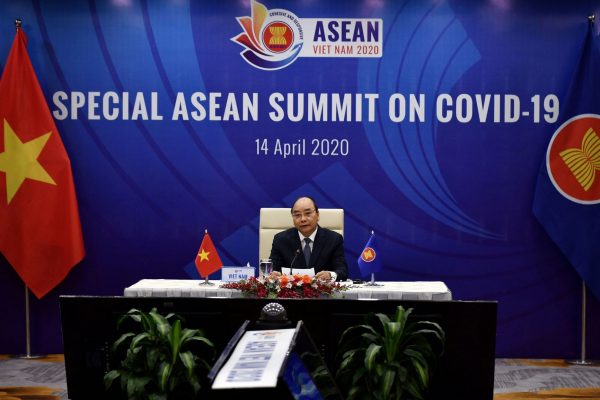If ASEAN’s response to COVID-19 is assessed against the expectation that with over 50 years of institutional and consensus building, it should have been more proactive in its response to what Singapore Prime Minister Lee Hsien Loong called ‘the gravest public health crisis that mankind is facing in this century’, then yes, ASEAN’s response failed to meet the mark. But if we take a step back and understand ASEAN’s purpose and the ASEAN Way, it has hardly lost its way. ASEAN responded precisely in the way it was designed to.
The impression that ASEAN is not doing enough to combat COVID-19 stems from a longstanding caricature of it as a talk shop. ASEAN’s penchant for issuing statements and its misperception as a mere venue-provider for engagement with larger states over regional issues have given it the reputation of a passive actor. COVID-19 seems to have amplified this perception, especially when the rapid spread of COVID-19 is juxtaposed against the timeline of responses in Southeast Asia.
On 11 March, when the Philippines became the first ASEAN state to implement a lockdown, there were 841 infections and 11 deaths in Southeast Asia. In April, when Cambodia went into lockdown, the number of infections had multiplied almost 20 times to 16,919 and fatalities 54 times to 593. Since the 14 April Special ASEAN+3 COVID-19 Summit, the virus has infected another 3910 people and claimed the lives of 253 more. Though ASEAN leaders implemented a range of measures, this belated push for a whole-of-ASEAN community approach was a case of too little, too late.
But is this a fair assessment? ASEAN is an inter-governmental organisation (IGO), not a supranational body like the European Union. ASEAN does not have an independent executive authority and instead functions on consensus, ultimately relying on the goodwill and cooperation of its 10 member states. This method of operation labelled as the ‘ASEAN Way’ is anchored on ASEAN’s founding principles and allows for regionalism to flourish without negating the primacy of the nation state.
By ensuring political costs are outweighed by the benefits of membership, ASEAN continues to be relevant in an incredibly diverse region. Expecting ASEAN to pivot away from soft institutionalism even amid the current health crisis is unrealistic.
But should ASEAN be let off the hook and allowed to rest on its well-established principle of non-interference during the COVID-19 pandemic? Although the original intent in forming ASEAN in 1967 was not to deal with a global health crisis the likes of which we are witnessing today, still it has grown into a regional organisation with the potential to further develop its mechanisms and capacities without compromising on its core principles. ASEAN’s soft institutional structures do not prevent it from taking necessary actions, even if these actions are ad hoc.
ASEAN has demonstrated agility as an IGO in responding to the pandemic. Within four days of the World Health Organization declaring COVID-19 a Public Health Emergency of International Concern and a day after its Strategic Preparedness and Response Plan, ASEAN activated its seven collaborative health mechanisms. This includes its Emergency Operations Centre Network for public health emergencies guided by the ministerial-level ASEAN Coordinating Council. Track one and two intra-ASEAN meetings held in March led to a slew of policy responses that demonstrate how Southeast Asian states are actively cooperating and seeking ways to mitigate the impacts of COVID-19.
Prompt and collective actions are ensuring existing cooperative mechanisms function efficiently and are keeping regional and extra-regional supply chains intact, while enhancing the sharing of medical information and best practices. Further, ASEAN leaders — while focusing on saving lives — are acutely aware that prolonged economic closures and disruptions can easily ignite domestic social instability.
As the crisis grew, so did ASEAN’s response. In mid-April, ASEAN leaders moved decisively to establish the COVID-19 ASEAN Response Fund to ensure sufficient medical supplies in the region and activated the ASEAN Plus Three Emergency Rice Reserve to ensure food security. The existence of ASEAN’s Coordinating Centre for Humanitarian Assistance on disaster management with its stockpiles of emergency supplies is also proof that ASEAN has in place the necessary infrastructure to convert much-needed resources slated for use in the event of a natural disaster to a pandemic.
These critical measures implemented by ASEAN should not be overlooked. ASEAN is adeptly dealing with the current crisis. At its core, the ‘ASEAN Way’ is always about getting the job done, even in the absence of fanfare.
Haridas Ramasamy is an independent researcher and graduate student at the S Rajaratnam School of International Studies (RSIS), Nanyang Technological University (NTU), Singapore.
Wendy He is a research analyst in the Military Studies Programme at the S Rajaratnam School of International Studies (RSIS), Nanyang Technological University (NTU), Singapore.
This article is part of an EAF special feature series on the novel coronavirus crisis and its impact.

